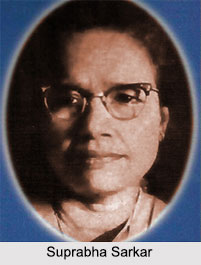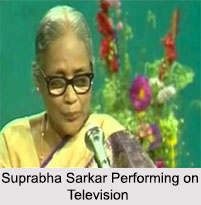 Suprabha Sarkar is one of the leading exponents of Nazrul Geeti songs. She had sung in several films along with several albums under the guidance of Hemanta Mukherjee and Shyamal Mitra. She even once composed songs. Among several films, some of the most popular ones, in which she sang, are "Samapti", "Sharey Chuattar", "Swayam Siddha", "Ma" etc. In her last years of life, she gave music lessons and was attached to several prestigious institutions. She was also appointed in All India Radio as a Nazrul Geeti trainer. Suprabha Sarkar died on 23rd September 1989.
Suprabha Sarkar is one of the leading exponents of Nazrul Geeti songs. She had sung in several films along with several albums under the guidance of Hemanta Mukherjee and Shyamal Mitra. She even once composed songs. Among several films, some of the most popular ones, in which she sang, are "Samapti", "Sharey Chuattar", "Swayam Siddha", "Ma" etc. In her last years of life, she gave music lessons and was attached to several prestigious institutions. She was also appointed in All India Radio as a Nazrul Geeti trainer. Suprabha Sarkar died on 23rd September 1989.
Early Life of Suprabha Sarkar
Suprabha Sarkar was born on 25th September 1919 to Upendranath Ghosh and Champaknalini. Her musical training started from her parents; her mother taught her devotional songs. Suprabha"s formal training in music started from Dhrupadia Shishir Guha and then from Tarapada Chakraborty. She first became a professional singer by participating in the show "Galpadadur Asar" in All Indian Radio at the age of 13 years.
 Career of Suprabha Sarkar
Career of Suprabha Sarkar
Suprabha Sarkar"s first gramaphone record was published from Senola Musical Products Company on February, 1936. The songs were written by Hashirashi Devi and composed by Nitai Ghatak. From 1937 to 1938, Suprabha recorded some songs for the Bharatbani Records. After that, she joined Hindustan Musical Products on June 1938 as their regular artiste. Her association with Nazrul Islam dates back to 1939 during the making of N.T. film "Sapurey". Nazrul Islam was extremely impressed with Suprabha Sarkar"s work, which later resulted in the popular "Kaberi Nodi Jole Ke Go Balika" on January 1941.
In 1949, Suprabha Sarkar composed two songs "Rodana Tomar" and "Jibone Amar Na Bola Kotha" written by Manik Basu. After this she never went for composing music. Then in the year 1953, she sang with Hemanta Mukherjee, who was also her trainer at that time. Then in 1955 she sang under the guidance of Shyamal Mitra. In the following year, she sang for Megaphone Company as well.
Suprabha Sarkar had also sung in several films some of which are "Shuktara" (1940), "Shapmukti" (1940), "Rajnartaki" (1941), "Aparadh" (1942), "Aahuti" (1941), "Kato Dur" (1945), "Pather Sathi" (1946), "Swapna O Sadhana" (1947), "Abhijog" (1947), "Swayam Siddha" (1947), "Natun Khabar" (1947), "Samapti" (1949), "Radharani" (1950), "Indira" (1950), "Sharey Chuattar" (1954), "Ma" (1956), "Paradhin" (1956) etc.
From mid 50"s she was heard less in films and albums. Since then, she started giving music lessons and got attached to Rabindra Bharati University, Surtirtha Sangeet Bidyalay and All India Radio (for teaching Nazrul Geeti). Apart from these official associations, she also gave lessons to her student personally.
Filmography of Suprabha Sarkar
Suprabha Sarkar had done playback singing in several films. The films are enlisted below:
| Year | Films |
| 1935 | Dhoop Chhayon |
| 1935 | Bhagyachakra |
| 1939 | Jiban Maran |
| 1940 | Shuktara |
| 1940 | Shapmukti |
| 1941 | Rajnartaki |
| 1941 | Ahuti |
| 1942 | Aparadh |
| 1945 | Koto Dur |
| 1946 | Pather Sathi |
| 1947 | Swapno O Sadhana |
| 1947 | Abhijog |
| 1947 | Swayam Siddha |
| 1947 | Notun Khobor |
| 1948 | Dhatri Debata |
| 1948 | Anjangarh |
| 1948 | Sadharon Mey |
| 1948 | Priyatamo |
| 1948 | Kalo Ghora |
| 1948 | Shyamaler Swapna |
| 1949 | Satero Bochor Pore |
| 1949 | Nirrudesh |
| 1949 | Singhadwar |
| 1949 | Jar Jetha Ghar |
| 1949 | Samarpan |
| 1949 | Cartoon |
| 1949 | Samapti |
| 1950 | Radharani |
| 1950 | Indira |
| 1954 | Sharey Chuattor |
| 1956 | Ma |
| 1956 | Paradhin |




















